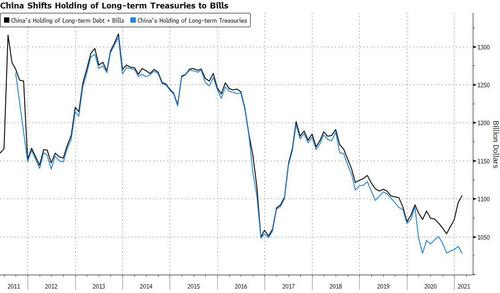Biden Gives Beijing Reason To Dump More Treasuries
By Ye Xie, Bloomberg reporter and Market Live commentator
Three things we learned last week:
1. The U.S.-China relationship remains tense.
For anyone who expects an improvement in the U.S.-China relationship, it’s been a disappointing early start to the Biden administration. President Biden has kept almost all of Trump’s China economic policies, including tariffs, and restrictions on Chinese tech companies. He rallied U.S. allies to put pressure on China over issues from human rights to cybersecurity.
Under these circumstances, China has most likely been divesting from the dollar and U.S. Treasuries for “logical tactical reasons,” said Stephen Jen, co-founder of London-based Eurizon SLJ Capital. “If the risks of financial sanctions by the U.S. are rising, why would SAFE (China’s State Administration of Foreign Exchange) hold so much U.S. Treasuries that could potentially one day be subject to confiscation or be frozen?” he said.
Indeed, China has sold Treasuries since 2018 when the trade war started. What’s interesting is that over the past year, its holding of long-term Treasury bonds have been steady, but its purchases of short-term bills surged to $76 billion, from $3 billion in February 2020, when the pandemic hit. The reason for the bill purchases is unknown, but it doesn’t look like a long-term commitment.
2. The weak jobs report supports the Fed’s dovish stance.
The shockingly weak U.S. jobs report was almost too bad to be true. It might have been because of technical factors such as seasonal adjustments or the lack of incentives for workers to return thanks to enhanced unemployment payments. But it certainly justifies the Fed’s cautious policy that it’s not the time to talk about removing stimulus. It’s likely to keep the dollar on the back foot.
Given the Fed now puts more weight on employment than on inflation under its new framework, the report should lower the markets’ sensitivity to this week’s inflation figure.
3. Strong data and currency give China a window to open capital markets.
China’s exports surged and the tourism spending during the Labor Day holiday shows consumption is recovering. The stable growth provides China a window to address some long-term structural issue, including cleaning up the debt overhang and opening up its capital account. Last week, China issued rules on Wealth Management Connect, which would allow investments across the border between Hong Kong and the nation’s southern region.
“While it is a small step in making investment abroad easier for qualified residents in Guangdong province, it is a big step toward China’s capital account liberalization experiment,” Citigroup’s economists led by Li-Gang Liu wrote.
Tyler Durden
Sun, 05/09/2021 – 21:40
via ZeroHedge News https://ift.tt/3vUQMIU Tyler Durden
